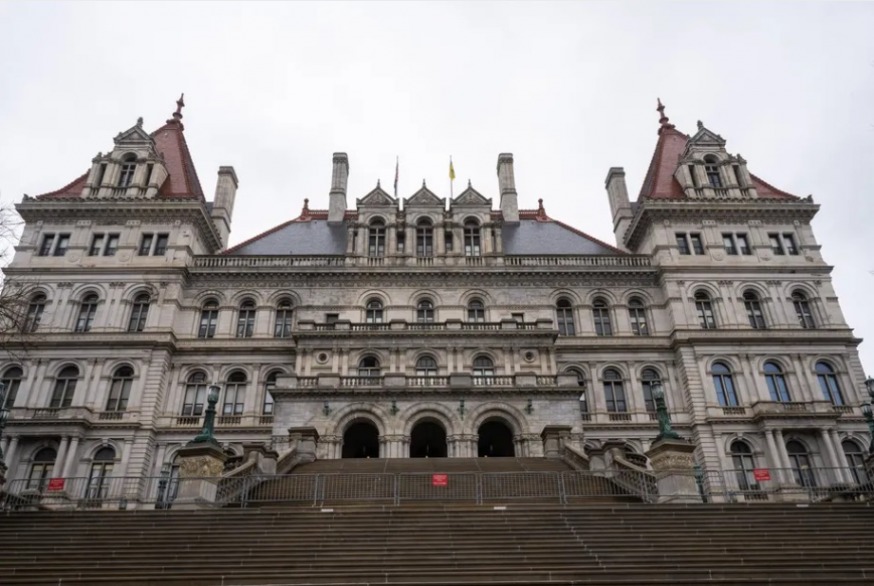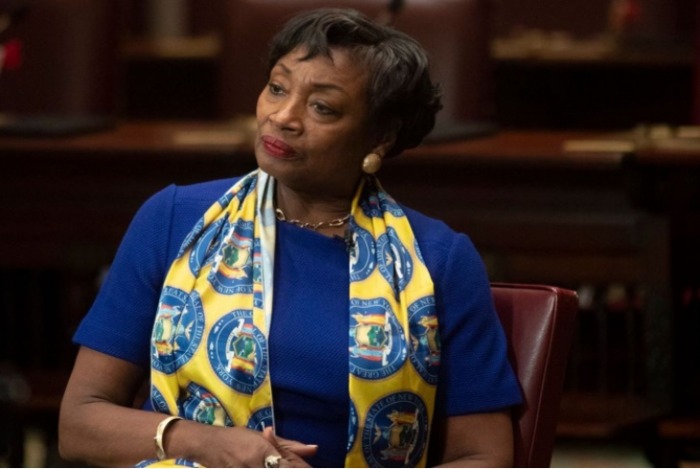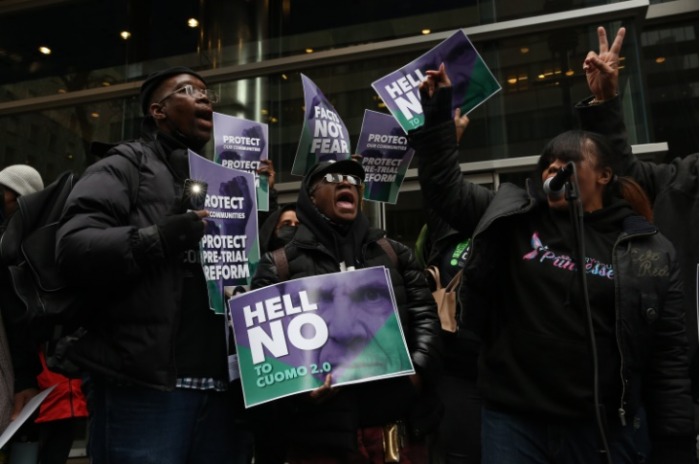
New York’s State Capitol building last week. | Darren McGee – Office of Governor Kathy Hochul

This article was originally published by The CITY on March. 31
Albany lawmakers departed the state Capitol Thursday for a long weekend without a deal on the state’s $216 billion spending plan — ensuring that the budget won’t be enacted by a midnight deadline Friday.
Gov. Kathy Hochul and Democrats leading the State Senate and Assembly remain at an impasse on several issues, above all over how aggressively to revisit bail reform and other criminal justice measures passed along with it in 2019.
New York law currently prohibits cash bail for most misdemeanors and non-violent felonies, and requires judges to release people with the least restrictive conditions imposed to ensure they return to court.
But lawmakers say they’re close to striking an agreement to reform the bail law a second time since it was passed three years ago, adding additional gun crimes to the the list of charges for which judges are permitted to set bail — such as being arrested more than once with an unloaded illegal gun — and lowering the threshold for gun trafficking charges, a bail-eligible crime, from 10 illegal guns to five, according to sources briefed on the discussions.
Also under discussion is the possibility of making additional offenses eligible for arrest instead of a desk appearance ticket, the sources said.
State legislators are still unlikely to consider including a provision in the bail laws that would grant judges the ability to weigh a defendant’s “dangerousness” when considering pretrial release measures — a change both Hochul and Mayor Eric Adams have been pursuing but that progressive lawmakers oppose, arguing it could result in racially biased decisions by judges.

New York State Senate Majority Leader Andrea Stewart-Cousins (D-Westchester) andrea.stewartcousins/Facebook
Senate Majority Leader Andrea Stewart Cousins (D-Westchester) was adamant Thursday afternoon that the “dangerousness” provision was off the negotiating table.
“We’re not introducing a dangerousness clause,” she told reporters at the state Capitol. “We don’t want poverty criminalized and that’s our reality.”
‘Getting Closer’
Lawmakers are not expected to reconvene until Monday. Meanwhile, they’re dealing with COVID infections among members of Hochul’s team and news that an upstate judge has invalidated their recently redrawn legislative district lines — a ruling that Hochul and Attorney General Letitia James said they intend to appeal.
Through the weekend, the governor’s office and legislative leaders are expected to continue to hammer out budget details, which are subject to change at a moment’s notice.
“We are getting closer to agreement, with consensus on major policy items,” Hochul said in a statement.
“New Yorkers should know that progress is being made and that we will put in the time it takes to reach an agreement that delivers for them and moves our state forward,” she added.
While Hochul’s first budget as governor will be late, practically speaking she and Legislature have until Monday to enact a financial plan for New York before state workers will see payroll disruptions.
Still under consideration are proposals for $3 billion in additional child care funding, health insurance coverage for undocumented New Yorkers, alcoholic drinks to go and suspension of the state sales tax on gasoline.
Also in the mix is a second try at another piece of the 2019 criminal justice reform package: a law specifying deadlines and other rules prosecutors have to follow when turning over evidence to the defense in criminal cases, in a process known as discovery.
Currently, the law requires district attorneys to deliver a wide array of evidence, including police records and body camera footage, in a matter of weeks. The discovery rules can enable defense attorneys to win case dismissals, even for what prosecutors view as relatively innocuous disclosure failures.
Prosecutors say the laws also put immense pressure on assistant district attorneys and support staff to search through voluminous bodies of evidence, much of which they note will never make it to trial.
According to people briefed on the proposal but not authorized to speak publicly, the changes to the discovery reforms are “very technical.”
A draft summary of a Hochul proposal from earlier this month, viewed by THE CITY, would give prosecutors wiggle room to be in “substantial compliance” with their current evidentiary requirements, but how such an assessment would be made is unclear.
Hochul has been an ally of district attorneys in their efforts to ease the demands on prosecutors as she faces her first election as governor.
“We welcome many of the amendments proposed by the governor,” said Washington County District Attorney J. Anthony Jordan, president of the District Attorneys Association of New York. “We also continue to ask that the state provides counties with a steady and reliable stream of funding to comply with the expanded and expedited exchange of discovery.”
The 2019 discovery overhaul toppled an evidence-sharing statute known colloquially as the “Blindfold Law’’ because it allowed prosecutors to claim they were “ready” for trial early on, stopping the speedy trial clock, and hold back on key disclosures until the eve of opening arguments.
These at-times disingenuous statements of readiness could cause cases to drag on for months and then years, a system failure that helped keep many New Yorkers, like Kalief Browder, in jail pre-trial and in the dark.
But after the reforms went into effect, rank-and-file prosecutors say the new rules, requiring large-scale disclosures within 20 to 35 days, proved overwhelming.
“All of a sudden, it became less about doing justice, and more about collecting scattered paperwork and putting it all in one place,” said W. Dyer Halpern, a former prosecutor who left the Bronx District Attorney’s Office this January.
“Prosecutors began to come to the conclusion that it was more practical to not meet discovery obligations and let a case get dismissed than it was to try and do all the discovery on every case assigned to them,” he continued.
Prosecutors, and even some judges, have also argued that defense attorneys are taking advantage of the reform statute: keeping quiet about insubstantial paperwork they knew had not been turned over, then filing motions in the hopes of winning dismissals on technical speedy trial grounds.
In a recent decision, Bronx Criminal Court Judge Jeffrey Zimmerman lambasted defense lawyers.
“The People acted in good faith, and the defense got the discovery it needed. So how did we get here?” opined Zimmerman. “How have we arrived at a place where motions of this nature, with little chance of success, are routinely filed on the eve of trial, thus further delaying the timely resolution of cases?”
Silent Partners
Defense attorneys point out that most prosecutors, many of whom now call themselves “progressive,” have not been willing to go public about their advocacy on the issue, instead pushing for changes through the legislature’s murky budget process, where policy is baked into the spending plan to shield lawmakers from politically risky votes.
Of the five city borough prosecutors asked by THE CITY to state their stand, only Queens District Attorney Melinda Katz responded with a statement identifying specific legislative changes.
Echoing the governor, Katz’s office said that while it supports early and comprehensive discovery, it also believes that evidence-sharing obligations should be limited “to relevant and material information.” Katz also supports changes which would allow prosecutors to stop the speedy trial clock, which limits how long they can try a case, once they have “substantially” complied with discovery obligations.
“Experience has informed us the discovery statute can be improved by amending some of the requirements that elevate form over substance and therefore are not always in the interest of justice,” said Chris Policano, a spokesperson for Katz.

Ben Fractenberg/THE CITY
Criminal justice reform advocates protested outside Governor Kathy Hochul’s Midtown office against her push to roll back parts of state’s bail reform packages, March 23, 2022.
The Bronx, Brooklyn, Manhattan and Staten Island district attorneys did not respond to or declined to respond to requests for comment.
In the meantime, public defenders and other defense attorney groups have tried to hold the line, fearing that the rollbacks now under consideration could take away any teeth the law has.
“This proposal, if adopted in the final budget, would fundamentally destroy discovery and Kalief’s Law by removing the key mechanism to ensure that the prosecution discloses critical documents to the defense in a timely manner,” said Redmond Haskins, a spokesperson for the Legal Aid Society, New York City’s largest public defender organization.
“Cases will drag for years, our clients will languish in jail and be forced to make critical decisions about their cases without seeing the entirety of the evidence,” he added.” This would summarily reinstate the Blindfold Law as we know it.”
THE CITY is an independent, nonprofit news outlet dedicated to hard-hitting reporting that serves the people of New York.
One Comment

If the prosecutors are overwhelmed by the laws requiring them to promptly disclose potential exculpatory evidence to defendants (to their counsel if they are represented,) those prosecutors should hire more staff. The stories about innocent defendants being convicted and incarcerated for years, sometimes decades, because such evidence was withheld should be enough reason to make this disclosure a high priority, along with the horror stories about those who commit suicide during or after long periods of incarceration on Rikers’ Island without their cases ever getting to trial. I’m not pro-criminal; I’m pro-justice.